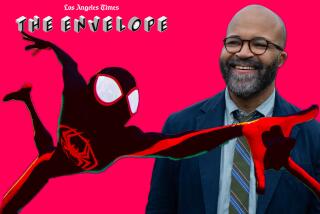Book review: ‘The Men Who Would Be King’ by Nicole LaPorte
The 1990s were the financial apogee of Hollywood, a period when billions in fresh capital flowed into the coffers of the studios in the expectation that the world had an infinitely expanding need for American entertainment. With new cable networks launching to fill the multi-channel universe and huge multiplexes sprouting in shopping centers across the country, the demand for a steady supply of TV shows and movies to fill the pipeline was projected to be limitless. It was a happy time to be a movie producer.
This is the economic backdrop for “The Men Who Would be King,” Nicole LaPorte’s exhaustively reported book about DreamWorks SKG, the first new major Hollywood studio in more than half a century. LaPorte’s lengthy narrative is the definitive history of the studio, an achievement of dispassionate reporting in the genre of corporate decline-and-fall.
Formed in 1994 by three of the most powerful figures in the entertainment business — music mogul David Geffen, director Steven Spielberg and fired Disney executive Jeffrey Katzenberg — DreamWorks was going to be the model Hollywood studio for the 21st century, a filmmaker’s Valhalla with a communitarian ethos where employees didn’t have titles and the commissary served free breakfast and lunch.
Eleven years later, the dream was over.
DreamWorks, the studio that during its chaotic, incandescent life beget “American Beauty,” “Saving Private Ryan,” “Gladiator,” “Almost Famous,” “Dreamgirls” and “Shrek,” couldn’t in the end financially sustain itself and was sold to Paramount. Like a family splitting up, Geffen eventually moved out. Katzenberg took the animation division and its “Shrek” franchise to create a new public company, DreamWorks Animation. A few years later Spielberg and his new partner, Stacey Snider, were able to have what remained of DreamWorks’ “live-action” division, rescued by an India-based industrial conglomerate that wanted a foothold in Hollywood, and begin making movies anew.
For readers interested in the power players, inside dealings and tick-tock accounts of Hollywood filmmaking, “The Men Who Would Be King” provides all the necessary fixtures and referents. When it comes to the outsized ambitions and maniacal personalities of the contemporary film industry, they don’t come bigger than those of Messrs. Geffen, Spielberg and Katzenberg.
Each was already a billionaire (well, Geffen and Spielberg, anyway) before they launched DreamWorks, with a long history at the forefront of the popular culture machine. And each (Geffen and Katzenberg, at least) had starring roles in two of the best modern-day books about corporate Hollywood, Tom King’s biography of Geffen, “The Operator,” and James B. Stewart’s withering portrayal of former Walt Disney Co. chief executive Michael Eisner in “DisneyWar.”
Hollywood, with its penchant for sunny publicity and obsession for secrecy, is a notoriously difficult business in which to uncover the truth. A former contributor to this paper (her husband worked here as well), LaPorte deserves credit for penetrating at a microscopic level and reconstructing verbatim dialogue that occurred inside DreamWorks’ meetings. Most reporters are not up to the task. LaPorte is.
Want to know the background on how “American Beauty” was made? There’s a chapter on it. The nasty Oscar war for best picture between Miramax’s “Shakespeare in Love” and DreamWorks’ “Saving Private Ryan”? One on that, too. How the animated films “Prince of Egypt” became a huge disappointment at the beginning and “Sinbad” nearly sank the studio at the end? Ditto and ditto.
Indeed, at times it feels like there is a chapter on every film that DreamWorks made, and though the detail is impressive, the cumulative effect is that LaPorte’s narrative loses sight of the ultimate question: Why is the story about DreamWorks important, and why we should care?
The problem is, by the end of the book, we don’t care. We just want the story to be over and done. We are as exhausted as the people who worked there and grew disillusioned. Yes, perhaps the DreamWorks principals were chastened by the changes in the movie business they couldn’t fathom, but more likely they were satisfied with the millions they made, even though the company itself was managed haphazardly, and its chief asset — Spielberg — spent much of his time at DreamWorks making movies for other studios.
We also are left, sadly, with no new insights into Geffen, Spielberg and Katzenberg. Even readers who may be only casually acquainted with the egos of Hollywood probably know that Geffen is ruthless and sometimes cruel, Spielberg is cocooned by factotums and apostles, and Katzenberg is indefatigably ambitious and self-aggrandizing. Possibly the only individual in Hollywood who has had more media exposure than those three is Michael Jackson.
Still, “The Men Who Would Be King” will be required reading for anyone interested in the story of DreamWorks. Yes, it has a limited appeal, but for a first book, it boasts the chops of a veteran author who can tackle a difficult assignment. Based on the portraits she draws here, one hopes LaPorte will apply her skills to biography next.
The Men Who Would Be King
An Almost Epic Tale of Moguls, Movies, and a Company Called DreamWorks
Nicole LaPorte
Houghton Mifflin Harcourt: 544 pp., $28
More to Read
The biggest entertainment stories
Get our big stories about Hollywood, film, television, music, arts, culture and more right in your inbox as soon as they publish.
You may occasionally receive promotional content from the Los Angeles Times.










